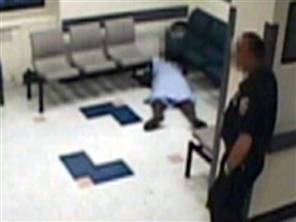July 7, 2008
Esmin Green Died Because Only Kings County Hospital Cared

You can read about the case here, but the summary is that a psych patient dies in a Kings County psych ER, and no one notices.
There's indignation and outrage all around, of course, so I won't repeat it here. But I will suggest that the reason it happened has little to do with Kings County.
There's a perfect storm of causes, but three in particular matter most, in ascending order:
1. Racism.
I don't mean "we hate black people" racism. I mean the "multiculturalism worked too well" racism, by which people are now hyperaware of the differences between the races, and so and attribute too much to those differences. "Oh, black people in the ER? Yeah, that happens. They come in when it rains." or: blacks get diagnosed with schizophrenia, whites with bipolar. (Deny it.)
And don't go blaming white doctors; the black doctors I know are no different. Nor are the nurses or social workers.
2. Poverty.
Do you think psych ERs are overcrowded because of the gigantic number of crazy people? Are they overflowing with depressed bond traders? They're overcrowded because of the number of poor people. I'm not justifying their poverty nor blaming them for it, I am stating as fact that the only option for a person with no resources who doesn't want to sleep in a homeless shelter is psychiatry. Throw in a healthy dose of drug and alcohol addiction, and all roads lead to County.
There's a joke by comedian Greg Giraldo (from memory):
Before Katrina, I wasn't really aware of the extent of poverty in this country. Because so often, poor people look just like black people. So they're easy to miss.I'll add: reclassify those poor black people as mental health patients, and you have just made an entire social problem disappear.
3. The Welfare State: it's psychiatry.
The sum total of the problem is that psychiatry is expected to be the default social safety net, the bizarre justification being since nothing in psychiatry is entirely the patient's fault, then anything that isn't the patient's fault must belong to psychiatry, including drugs, violence, poverty, etc. The tautology of psychiatry is: if you came to psychiatry for help, you must need psychiatry's help.
Most of these people have few social options. And it helps hide this fact that so many of these people are black-- the expectation of them is less, and minor improvements are considered thunderous successes. These next two sentences are absolutely not lies: 1) we used to be thrilled that a patient actually went to his welfare appointment after discharge. 2) if a male patient threatened to, or did, assault his girlfriend or wife, we were relieved when he agreed not to return home. Problem solved.
But psychiatry takes in these people with no options. And psychiatry can never say no.
So it doesn't say no; it becomes passive-aggressive. For example, it lets you linger in psych units until you decide you want to leave.
While I have no information to defend or indict Kings County-- it sure sounds bad-- but I will say that the failings of city psychiatric hospitals are really the failings of a society that forced them into this position. She died at Kings County because society didn't want her dying anywhere else.
The grey areas of criminal justice; of social work; of morality; of chronicity-- why turn to psychiatry to fill the gaps? A lack of other options does not justify this; psychiatry is not "better than nothing"-- it may be worse than nothing in some cases.
And patch work by psychiatry props up the levees, hides the need for structural reform. Psychiatry is like welfare-- just enough to keep the people from rioting.
It doesn't matter if these problems have a "biological component--" empty words, like we're building a machine. The problem isn't the guy's biological component of his behavior, the problem is the guy. What are you going to do about the guy? Zoloft?
The solution is not obvious; money will not solve this, more hospitals, more doctors, more awareness, etc, do not lessen the burden, they widen the problem. People are not less depressed than they were 50 years ago, but there are a lot more people who are in treatment for depression. Figure that out.
Step 1: limit the scope of psychiatry. Limit what we are actually going to call depression, let alone medicate. Limit who we will actually call a patient, and for how long. Not all suffering should be treated.
Step 2: identify why there are increasing numbers of people who are falling through the cracks, despite universal education, social security, and gigantically abundant healthcare. Let alone plenty of jobs and opportunities. The question is not what are we going to do, but how are we defining the problem? The solution might be the same, but the definition drives the future. Ritalin works, but it matters a lot whether you call it a treatment or an enhancement. Government checks are money but it matters a lot whether you call them "stimulus" or "assistance."
Step 3 is the hardest, most important one: identify why a massive number feel like they are falling through the cracks, even when they are not. What are they being told, being promised, that they do not feel they are getting? What are the expectations, and where did they come from? How are people defining their position in the world?
24 Comments